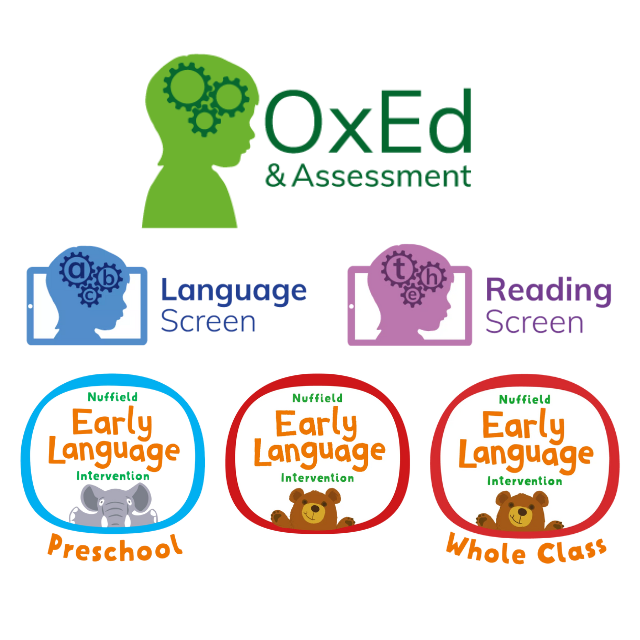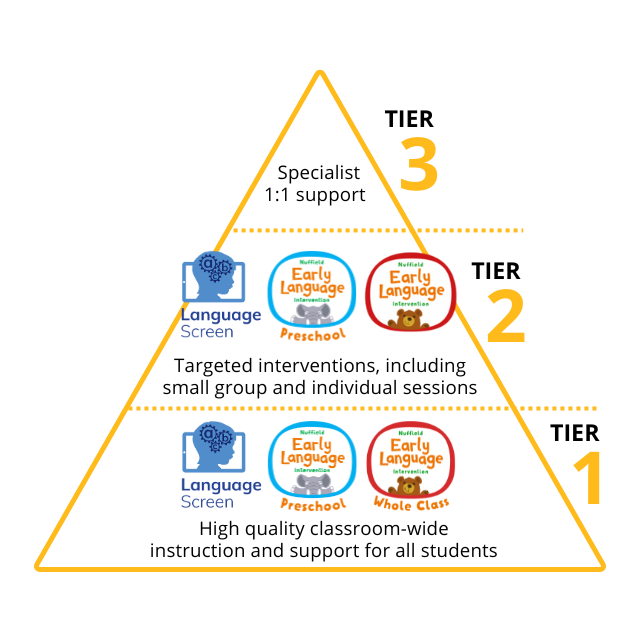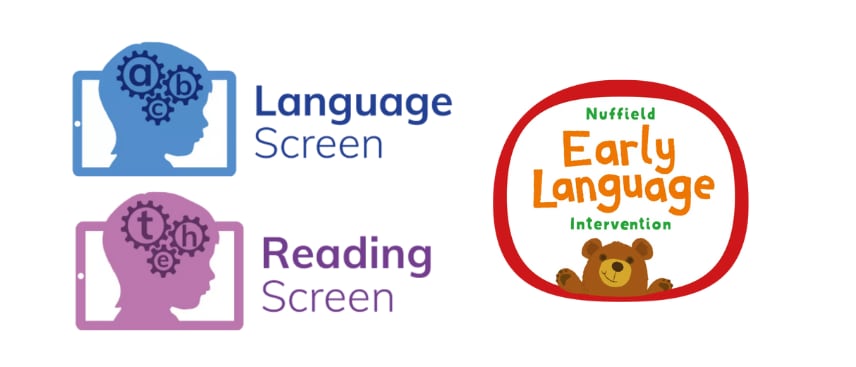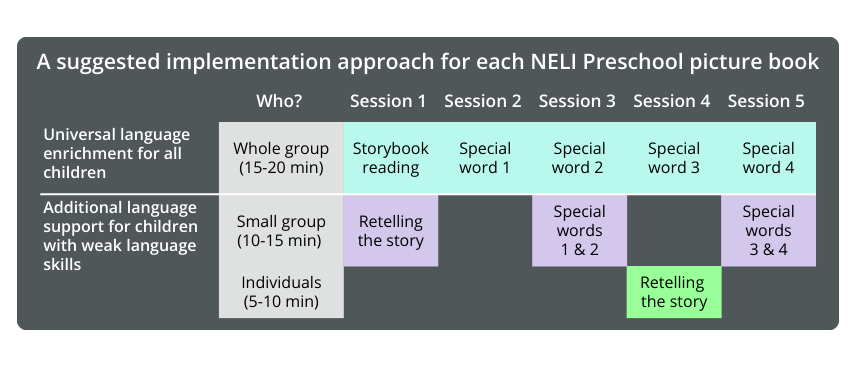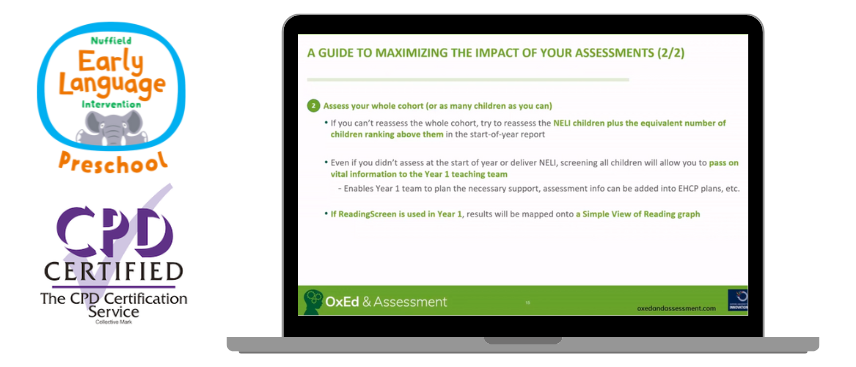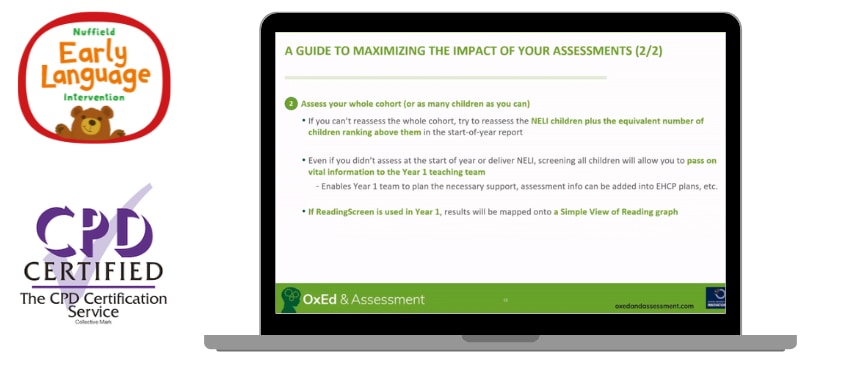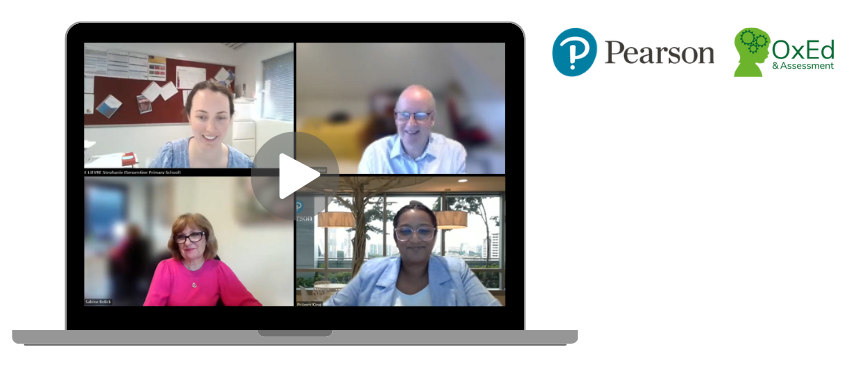Overview
Pearson Australia is proud to partner with OxEd & Assessment, transforming research evidence into practical applications for preschools and primary schools.
-
Year Levels Preschool–6
-
Curriculum ACT, NSW, NT, QLD, SA, TAS, VIC, WA, NZ
-
Subject Literacy
-
Resource Formats Print, Digital
-
Learning Focus Oral language, Intervention, Vocabulary, Synthetic phonics and decodable readers, Structured Literacy
-
Last Updated Jan 2025
OxEd resources
Oral language is the cornerstone of literacy development.Pearson has teamed up with OxEd & Assessment to bring you a comprehensive suite of evidence-based resources designed to boost oral language skills for students aged 3-11 in Australia and New Zealand. The resources include:
- screening for students’ oral language and reading abilities.
- interventions for students needing extra support
- whole class instruction to enrich the oral language skills of all students
- CPD-certified training and webinars to help you effectively implement OxEd resources.
At Hunter Christian, we have embedded oral language into our teaching, and it has become the foundation for our literacy curriculum. We can also see the benefits across the wider curriculum – the vocabulary and verbal tools that students build in their NELI sessions enable them to engage in maths, arts and crafts, and other subjects.

Understanding the critical importance of oral language in literacy development
Recorded 4th September 2024 with expert guests Professor Charles Hulme and Stephanie Le Lievre.
How it helps
In Australia nearly one quarter of students start school poorly equipped to benefit from learning opportunities due to oral language difficulties. Without intervention, these children may experience lower educational attainment as well as socio-emotional and behavioural issues.
OxEd’s oral language resources can be used to support schools at Tier 1 and Tier 2 of the Multi-Tiered System of Supports (MTSS) framework. The resources will help schools follow best-practice intervention practices and lay the groundwork for enriching vocabulary and enhancing comprehension and communication skills for all students.
The research behind OxEd
OxEd resources are based on the Science of Learning research and have been proven to be effective in evaluations, including randomised controlled trials and independent evaluations. These evaluations have consistently demonstrated the effectiveness of OxEd’s assessments and interventions in improving students' educational outcomes. Key findings show:
What it includes
Explore OxEd’s oral language resources, all adapted for preschools and primary schools in Australia and New Zealand.
Assessments
LanguageScreen
LanguageScreen is an assessment tool designed to accurately measure a child’s oral language abilities. It offers a fast, precise and objective way to monitor students’ progress, helping to identify those who may need intervention or specialist support.
LanguageScreen can be used in isolation or in conjunction with oral language resources including NELI Preschool, NELI Whole Class, NELI Intervention.
Features of LanguageScreen:
- three age-based versions ensure the appropriate level is delivered to every student
- takes less than 10 minutes to administer
- can be administered by teachers or teacher aides
- is suitable for tablets and desktops
- doesn’t require any paper marking or calculations
- provides instant, standardised results in a detailed report
- content adapted for Australia and New Zealand with Australian audio
LanguageScreen consists of up to four tests of fundamental language skills:
- expressive vocabulary
- listening comprehension
- receptive vocabulary
- sentence repetition.
Assessments
ReadingScreen
ReadingScreen is a quick and accurate digital assessment of word and nonword reading for students aged 4.5 to 12 years. It identifies students needing extra support to make progress in reading.
Features of ReadingScreen:
- takes 2-10 minutes to complete
- can be administered by any teacher or teacher aide
- suitable for tablets and desktops
- provides instant, standardised results in a detailed report
- includes Australian pronunciation guide
ReadingScreen assesses:
- Word reading: assesses recognition of increasingly difficult words and is a measure of single word reading ability
- Nonword reading: measures phonic decoding ability to decode unfamiliar nonwords.
Assessments
Assessment bundle
Combining LanguageScreen and ReadingScreen provides a powerful, comprehensive assessment tool.
When students are assessed with both screeners, you get an instant view of their scores on a Simple View of Reading graph, helping educators determine the best support for struggling readers.
This approach clearly highlights whether students have issues with decoding or language comprehension, making it easier to tailor interventions effectively.
Assessments
Purchase options
To learn more about the assessments and to request a quote for your school, please complete the form below.
Schools seeking oral language intervention are encouraged to complement the Assessment Bundle with the NELI Whole Class and NELI Intervention programs.
NELI Preschool
What it is
NELI Preschool is a research-backed program designed to enhance children’s oral language skills before they start formal schooling. Through shared book reading and guided play, children develop their vocabulary knowledge, storytelling skills and active listening skills.
The program is aligned with the Early Years curricula for Australia and New Zealand.
Each NELI Preschool Kit contains:
- 20 Nosy Crow picture books featuring a mix of contemporary stories, traditional folk tales and non-fiction
- two print Teaching Handbooks filled with fully resourced and supported sessions to make delivery as easy as possible
- over 80 beautiful and durable flashcards to teach target vocabulary
- story sequencing and weekly session cards, and press-out characters for small group and individual sessions
- Neli the elephant puppet
- Listening Rules poster and stickers
- access to the Digital Resources Library with digital slides of the books, printable newsletters for home learning and song files.
NELI Preschool
Implementation
The length of the program is flexible but generally completed in 20 weeks. It consists of:
- five 15-20 minute whole group sessions per book
- three 10-15 minute small group intervention sessions per book (suitable for three children per session)
- one 5-10-minute individual intervention session per book per child.
Preschools should ideally start implementing NELI from the start of Term 2 after using LanguageScreen to identify students in need of intervention and following completion of the provided NELI training. Following the program, preschools are recommended to assess children’s progress by repeating LanguageScreen assessment.
NELI Preschool
Training and support
NELI Preschool offers CPD-certified training courses to help teachers and teacher aides understand the importance of oral language and gain the skills needed to effectively deliver the program. The training, which takes 8-10 hours, is available online and on-demand via FutureLearn. All teachers and teacher aides implementing NELI Preschool must complete it. The courses cover:
- the importance of oral language and how NELI Preschool supports student development
- practical steps for implementing NELI Preschool.
Trained educators also have access to ongoing support, including:
- a learning community for sharing and reflecting on experiences
- additional resources and support via the Delivery Support Hub
- a program of webinars.
NELI Preschool
Purchase options
NELI Preschool includes access to LanguageScreen, the NELI Preschool Training for all administrators, and all the NELI Preschool Kit components:
- 20 Nosy Crow picture books
- two print Teaching Handbooks
- story sequencing and weekly session cards
- press-out characters
- Neli the elephant puppet
- Listening Rules poster and stickers
- access to the Digital Resources Library with digital slides of the books, printable newsletters for home learning and song files.
To find out more or to request a quote for your preschool, school or organisation, please complete this form.
NELI Whole Class and Intervention
NELI Whole Class
NELI Whole Class is a companion to NELI Intervention for Foundation to Year 2 students. Classroom teachers deliver oral language enrichment to the entire class which also works to consolidate the knowledge and skills of NELI Intervention students. The program includes three 20-30 minute sessions per week over 20 weeks and runs simultaneously with NELI Intervention.
NELI Whole Class contains:
- a printed Teaching Handbook with activity sheets
- six sets of digital slides for the same six topics as NELI Intervention
- digital narrative sequencing cards
- 11 songs in mp3 format
- six audio stories in mp3 format.
NELI Whole Class is used in tandem with NELI Intervention but is delivered by classroom teachers, while NELI Intervention can be delivered by teachers or teacher aides.
NELI Whole Class and Intervention
NELI Intervention
NELI Intervention is a 20-week, research-backed oral language intervention proven to improve students’ oral language and early literacy skills. It is delivered by teachers or teacher aides to Foundation to Year 2 students identified through LanguageScreen testing with oral language difficulties. The program includes:
- three 30-minute group sessions per week (for 3-6 students)
- two 15-minute individual sessions per week
Each NELI Intervention Kit contains:
- two Teaching Handbooks (Part 1 and Part 2) filled with fully scripted and resourced lessons
- topics aligned to the Australian and New Zealand curricula such as My Body, Things We Wear, People Who Help Us, Growing, Journey and Time
- colourful flashcards for key vocabulary and story cards for narrative activities
- Ted, a cute puppet to engage students and aid teaching students.
NELI Whole Class and Intervention
NELI training and support
NELI Intervention and Whole Class are supported by CPD-certified online training courses that enhance teachers’ and teacher aides’ understanding of oral language and equip them with the skills to deliver the programs effectively. These on-demand courses are available via FutureLearn and must be completed by all NELI implementers. The courses cover:
- the importance of oral language and how NELI supports student development
- practicalities of implementing NELI programs
- structure and content of letter sounds and phonological awareness (for NELI Intervention only).
Trained educators also have access to ongoing support, including:
- a learning community for sharing and reflecting on experiences
- additional resources and support via the Delivery Support Hub
- a NELI Intervention refresher course
- a program of webinars.
NELI Whole Class and Intervention
Implementation
Suggested timing for implementing NELI Intervention and NELI Whole Class
Term 1:
- Administer LanguageScreen to identify students in need of intervention
- Complete NELI Intervention and/or Whole Class training
Terms 2 and 3:
- Implement NELI Intervention and/or Whole Class
Term 4:
- Reassess students with LanguageScreen to measure progress
NELI Whole Class and Intervention
Purchase options
Schools must use LanguageScreen to benchmark students’ oral language skills before using the resources.
It is recommended that schools purchase one NELI Intervention / Whole Class kit for each teacher who will be implementing the program.
To learn more about NELI and NELI training, and to request a quote for your school, please complete the form below.
Practice assessment and samples
Try a practice assessment and download sample reports, as well as NELI Whole Class and NELI Intervention sample pages, curriculum charts and brochures.
The LanguageScreen practice assessment allows you to view and use the assessment to see how simple it is! The practice is for sample purposes only so it will not generate a live report, however, you are encouraged to download the sample report below to understand what you can expect when LanguageScreen is used with students.
Practice the LanguageScreen assessment
- OxEd — Languagescreen Assessment Report — Sample Download PDF (1.1MB)
- OxEd — Simple View Of Reading Report — Sample Download PDF (293KB)
The ReadingScreen practice assessment allows you to view and use the assessment to see how simple it is! The practice is for sample purposes only so it will not generate a live report, however, you are encouraged to download the sample report below to understand what you can expect when ReadingScreen is used with students.
Practice the ReadingScreen assessment
- OxEd — Readingscreen Assessment Report — Sample Download PDF (173KB)
- OxEd — Simple View Of Reading Report — Sample Download PDF (293KB)
View the NELI Preschool flipbook
- OxEd — NELI Preschool — Sampler Download PDF (3.6MB)
- OxEd — NELI Whole Class Teaching Handbook — Sample pages Download PDF (836KB)
- OxEd — NELI Whole Class Digital Slides — Sample Download PDF (196KB)
- OxEd — NELI Whole Class Story Card — Sample Download PDF (5.2MB)
- OxEd — NELI Whole Class Songs — Sample Download MP3 (728KB)
- Oxed — NELI Group Sessions — Program Information — Sample Pages Download PDF (85KB)
- OxEd — NELI Group Sessions — Part 1 Topic 3 — Sample Pages Download PDF (62KB)
- Oxed — NELI Group Sessions — Part 2 Topic 1 — Sample Pages Download PDF (98KB)
- OxEd — NELI Individual Sessions — Program Information — Part 1 Sample Pages Download PDF (71KB)
- Oxed — NELI Individual Sessions — Program Information — Part 2 Sample Pages Download PDF (95KB)
- OxEd — NELI Flashcards— Sample Download PDF (449KB)
- OxEd — NELI Implementation Timeline Download PDF (753KB)
- OxEd — NELI & NELI Whole Class — Curriculum Chart — Australian Curriculum V9.0 Foundation Download PDF (205KB)
- OxEd — NELI & NELI Whole Class — Curriculum Chart — Australian Curriculum V9.0 Year 1 Download PDF (157KB)
- OxEd — NELI & NELI Whole Class — Curriculum Chart — Victoria Foundation Download PDF (145KB)
- OxEd — NELI & NELI Whole Class — Curriculum Chart — Victoria Level 1 Download PDF (133KB)
- OxEd — NELI & NELI Whole Class — Curriculum Chart — NSW Early Stage 1 (Kindergarten) Download PDF (125KB)
- OxEd — NELI & NELI Whole Class — Curriculum Chart — NSW Stage 1 (Years 1 & 2) Download PDF (117KB)
- OxEd — NELI & NELI Whole Class — Curriculum Chart — New Zealand Level 1 Download PDF (121KB)
- OxEd & Assessment — Information Pack — Pearson Download PDF (5MB)
- OxEd & Assessment — Brochure — Pearson AU Download PDF (4.3MB)
- OxEd & Assessment — Brochure — Pearson NZ Download PDF (4.3MB)
Webinar and training videos
Whether you are considering using OxEd resources or you're already using them, the webinar and training videos below will help you better understand how the components can be used most effectively and in different contexts.
Webinars
The critical importance of oral language in literacy development
Webinar overview
In September 2024, Pearson Australia hosted a webinar with Professor Charles Hulme, co-author of The Science of Reading on the critical importance of oral language in literacy development.
Charles is Emeritus Professor of Psychology in Education, University of Oxford and co-founder of OxEd & Assessment. He is an expert on reading, language and memory processes and their development. He has received numerous awards for his research, including the Distinguished Scientific Contributions Award of the Society for the Scientific Study of Reading (2019) and was ranked one of the top psychology scientists in the world (2023).
Charles was joined by Stephanie Le Lievre, co-director at Science of Teaching and Learning Australia and school Principal who is known for her work in evidence-based literary instruction, including oral language. Stephanie provided an insightful case study from Serpentine Primary School in Perth.
Webinar agenda
- the Big Six of Literacy, focusing on the crucial role of oral language and its connection to systematic synthetic phonics, reading, and overall literacy development
- how language and literacy screening can enhance students' literacy by identifying and addressing language issues
- strategies for supporting students needing oral language intervention, including EAL/D and ESOL students, based on research
- the impact of improved oral language on reducing behavioral issues
- the significance of professional development and training for teachers
- an Australian case study demonstrating these principles in action
- panel Q&A.
Webinars
Championing oral language in your school
Date recorded: 23 April 2024
Championing oral language in your school — Using the Science of Learning research to support early oral language development
Webinar overview:
In this webinar, the expert panellists explore the importance of early oral language skills and how your school can firstly, identify and then, address early oral language difficulties with greater accuracy and efficiency using resources from OxEd & Assessment. These resources are based on the Science of Learning research, have been proven to improve educational outcomes and are now localised for Australian and New Zealand schools.
This webinar is recommended for primary school educators interested to learn about:
- The importance of early oral language skills
- The research behind OxEd’s assessment and intervention resources
- How the assessment apps (LanguageScreen and ReadingScreen) can be used to accurately identify students with oral language and reading difficulties, and to track progress over time
- How the programs (Nuffield Early Language Intervention and NELI Whole Class) can be used by teachers and teacher aides to support a multi-tiered system of support (MTSS)
- Implementation in Australian primary schools and how these resources are making a difference.
Expert panellists:
Priteen King | Schools Engagement Manager | Pearson Australia
Priteen combines her experiences as a primary teacher in NSW with her expertise in the EdTech sector to help teachers deliver effective and engaging lessons with the aid of evolving technology and pedagogy. As a mother of primary aged-children, Priteen is known to test the practical feasibility of digital resources in her own home-classroom!
Sabine Bolick | Senior Content and Learning Specialist | Pearson Australia
Sabine has a wealth of experience in the education sector she specialises in the area of primary literacy and is co-lead of Pearson’s Primary Advisory Board where she nurtures the important connection between Pearson and the real-life experiences of teachers today. Sabine cares deeply about supporting teachers by delivering literacy resources that meet the real needs of today's classrooms.
Kerrie Scott | K-2 Literacy Coordinator | Our Lady of the Rosary Fairfield NSW
Kerrie has over 30 years of teaching experience specialising in reading difficulties. She became interested in this area when her own son was diagnosed with dyslexia. Kerrie went on to complete a Master of Special Education which in turn, led to her interest in developing students' abilities in word recognition and language comprehension.
Links referred to in the webinar:
- Study shows screen time is replacing vital language opportunities for toddlers (University of Adelaide, March 2024)
- Introduction to Science of Reading (AERO, Jan 2023)
- The Reading Guarantee: How to give every child the best chance of success (Grattan Institute, February 2024)
- Proven benefits of Language Screen and NELI
- OxEd & Assessment brochure
- App preview instructions & resource samples
- Curriculum charts for AC v9.0, Victoria, NSW and NZ
Webinars
From Reading to Language: The Evolving Understanding of Dyslexia
Webinar overview
In this webinar for World Dyslexia Awareness Day 2024, Prof Maggie Snowling, Professor Emerita of Psychology at the University of Oxford and the world's most cited academic in the field of dyslexia, takes us through the evolving understanding of Dyslexia, including:
- her journey as a dyslexia researcher
- how research continues to evolve our understanding of dyslexia
- breakthrough findings on early language development and its impact on how students learn to read
- practical strategies for early identification of early oral language difficulties.
Of particular interest to primary educators will be Prof Snowling’s commentary on a recent longitudinal study which found that 66% of children with early oral language difficulties would fill diagnostic criteria for dyslexia by age 8, compared with 7% of children in the control group.
Prof Snowling also offers practical tips for early identification of oral language delays in children and guidance on steps that can be taken to support these students with evidence-based intervention.
Meet the presenter
Maggie Snowling | Founding Director of OxEd and Assessment
Maggie is Professor Emerita of Psychology, University of Oxford. Formerly President of St. John’s College, Oxford where she continues as a Research Fellow. She is also an Honorary Fellow of the British Psychological Society, a Fellow of the British Academy and a Fellow of the Academy of Medical Sciences.
Maggie is a world-renowned expert on children’s reading and language difficulties (see publication list). She served as a member of Sir Jim Rose’s Expert Advisory Group on provision for Dyslexia in 2009. Maggie is a Fellow of the British Academy and Fellow of the Academy of Medical Sciences. In 2024 she was ranked the lifetime #1 scholar for dyslexia. Maggie was also named the top ranked scholar for language development in 2024 and one of the top psychology scientists in the world in 2023. Maggie was appointed CBE for services to science and the understanding of dyslexia in 2016.
Using the assessments
How to use LanguageScreen
Using the assessments
How to get ready to use the assessment apps
Using NELI
How to get the most out of NELI
Using NELI
What's the NELI training course (Course 1)
Using NELI
What's the NELI training course (Course 2)
Using NELI
What's the NELI training course (Course 3)
Using NELI
What’s the NELI Delivery Support Hub
Using NELI
How to conduct a NELI individual session
Using NELI
How to conduct a NELI group session
new
NELI Preschool
Learners at all levels have the opportunity to improve their oral language abilities with support from differentiated shared book reading and guided play.
Whether preparing students for schooling or helping students progress to age-level once they have started schooling, NELI Preschool builds a language rich environment that all students can benefit from.
The engaging resources are a delight to work with, helping to make oral language development fun and effective.
Discover NELI Preschool
